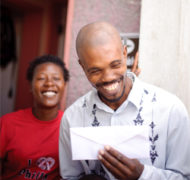Microfinance and the Dignity of Work
Blog / Produced by The High Calling
Meaningful work provides people with dignity. They have a sense of self-worth, which means their work has actual financial value and delivers them a paycheck. But it also means they spend their hours doing something that matters.
People in industrialized countries sometimes struggle to find meaning in our work. We get a paycheck, true, but that can make us feel like we are trading hours of living in exchange for money. Like Charlie Chaplin, we are cogs in the modern machine.
The solution for us isn't particularly radical. Much of what we need is an attitude adjustment, a new way of looking at our current jobs that helps us see the value we provide to our workplaces and our communities.
But what about people in third world countries? For years, I was taught that we should give some of our excess to help the less fortunate in Africa or China or India or Haiti. Take your pick. And we did. We have sponsored our share of children to receive education and health care. Some of our editors are traveling to Haiti in the near future to offer help. Laity Lodge Youth Camp travels to Haiti every year to lead youth camps there.
This morning in the newsfeeds, several articles brought all of this to mind.
First, the Star Tribune published an interview with Ward Brehm, the chairman of a federal agency that oversees African aid and development projects. Ward is a good man, with connections to my friend and mentor Dave Williamson. In For Africa, more than aid, Brehm explains,
Our agency is trying to focus on results. For every dollar we invest, we look to increase jobs, incomes, lower child mortality rates. Measurable results. See what's effective. Most importantly, rather than imposing Western solutions, we try to ask them for [local African] solutions. If you were poor, you'd want somebody to ask your opinion.
…We work with women in Tanzania who get microloans, maybe $500 ... for materials to make baskets. I brought samples to Target.
I said I don't want the Target Foundation. I want to meet with the buyers. My pitch on behalf of the ladies was that they were better quality and design than what Target was selling in its global marketplace shops. Target ordered 100,000 baskets. The most we could produce out of all our female cooperatives was 7,500. Target bought them. My point is that the poorest women in the world are capable of doing business with one of the richest corporations in the world.
Brehm is wonderful, but so personally inspiring that I feel a bit helpless. I can’t imagine traveling to Africa 35 times in two decades. His excellent work sets the bar so high that my own efforts seem pathetic by comparison.
That’s why I want to tell you about an article by Dan King, one of our editors here at The High Calling. In how to break the cycle of poverty in Haiti with art, Dan writes about a similar microfinance organization in Haiti and its work with an artist name Richard.
Richard received “the equivalent of about 3-4 months worth of typical income for a man in his position."
But along with this huge influx of cash came a great deal of responsibility. When Chris Marlow of Help One Now gave him the money, he also asked for something in return. This was Help One Now’s first venture into microfinance, and they wanted to leverage the opportunity to benefit others well beyond this first offering.
Richard, the recipient of this loan, is an artist. One of the requirements for this little experiment would be that Richard would produce 50 paintings that Chris could bring back to the U.S. with him, and it’s not because he has a big house with lots of empty walls.
Chris took the 50 paintings when they were completed and hosted an art show. The supporters who descended upon the Benelux Cafe in Raleigh, NC, admired the work of this talented young man from Haiti. But more importantly, they bought the artwork.
Ward Brehm’s story gives me hope because I sense that the leaders of the world are moving in the right direction. Dan King’s story gives me hope because it seems attainable. I don’t have to change the world. I don’t have to fly to Africa 35 times to make a difference for people outside our economy.
Even an artist in Haiti can make something of microfinance.
Ward Brehm can work on issues of scale. Dan King and Richard and Chris will do what they can where they can.
Hopefully, together we can all find meaning in our work at home and abroad.
Photo of Richard receiving his check by Mollie Donovan.





